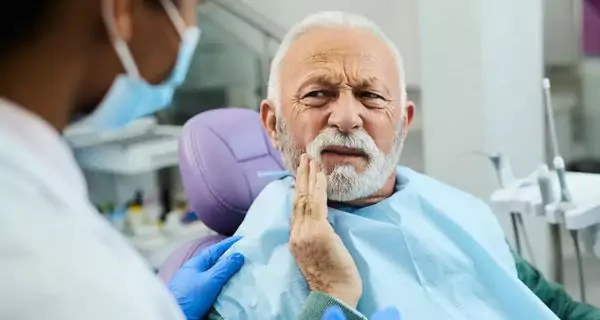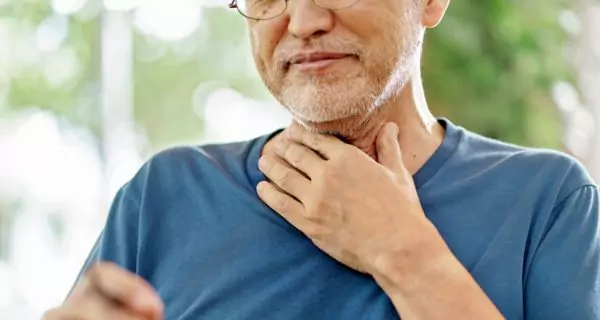Last Updated on: 19th September 2025, 12:31 pm
People with Parkinson’s disease often face oral health challenges like dry mouth, gum disease, tooth decay, difficulty chewing or swallowing, and teeth grinding due to tremors, muscle stiffness, and medication side effects. To manage these issues, it’s important to use electric toothbrushes, saliva substitutes, fluoride toothpaste, night guards, and adaptive flossers, while maintaining regular dental checkups to prevent complications and support overall well-being.
Parkinson’s disease is a progressive neurological disorder that affects movement, balance, and coordination. While it’s often associated with symptoms like a tremor and muscle stiffness, it can also make everyday actions—like brushing teeth, chewing, or speaking—more difficult, gradually impacting oral health.
People with Parkinson’s face various oral health issues such as dry mouth, tooth decay, gum disease, difficulty chewing, and bruxism (teeth grinding). In this article, we’ll explore the most common oral health challenges and share practical solutions, including helpful products, to support better daily care.
What are the common oral health issues linked to parkinson disease tremor?
Parkinson’s disease is progressive.While the symptoms—like tremors, muscle stiffness, and slow movements—might not seem directly connected to dental health, they can make daily oral care much more challenging.
In fact, there’s a two-way relationship between Parkinson’s and oral health. People living with Parkinson’s often experience dry mouth, trouble chewing, and difficulty maintaining oral hygiene, all of which can impact overall well-being and quality of life.
Let’s take a closer look at the most common oral health issues linked to Parkinson’s and how to manage them effectively.
Dry mouth (xerostomia)
Dry mouth is one of the most common oral health issues for individuals with Parkinson’s. It occurs when the salivary glands don’t produce enough saliva, a side effect often linked to both the disease itself and its medications.
Saliva plays a crucial role in protecting your mouth. It helps wash away food particles, neutralize acids, and fight harmful bacteria. Without it, the mouth feels dry and sticky, making it easier for cavities, gum infections, and bad breath to develop. You might also notice a dry tongue, cracked lips, or have trouble eating and speaking clearly.
Why it matters: Without enough saliva, bacteria multiply faster, and acids from food or plaque can damage the teeth. It also becomes uncomfortable to wear dentures or other dental appliances.
Products that help:
- Saliva substitutes Artificial saliva products such as Biotène Oral Rinse or SalivaSure help lubricate the mouth and prevent dryness.
- Hydrating mouth sprays such as XyliMelts coat the oral tissues and offer longer relief than drinking water alone.
- Mouthwashes for dry mouth like ACT Dry Mouth hydrate and protect the enamel at the same time.
- Chewing gum or lozenges: Sugar-free gums containing xylitol, such as Pur Gum, stimulate saliva production naturally.
In addition to using these products, it’s helpful to drink water regularly, use a lip balm to protect your lips, and avoid acidic or salty foods. It’s also important to stay away from habits like smoking, drinking alcohol, and consuming caffeine, as they can further dry out the mouth. Whenever possible, opt for alcohol-free mouthwashes.
With the right care and specific products, it’s possible to relieve discomfort and protect your oral health.
Gum disease (gingivitis and periodontitis)
If your hands shake or your grip is weak, brushing and flossing properly becomes a real challenge. This allows plaque to accumulate on the gums, harden into tartar, and eventually lead to gum disease.
Why it matters: Gingivitis starts with red, swollen, or bleeding gums. Left untreated, it can turn into periodontitis, a deeper infection that damages the bones supporting your teeth. This can cause tooth loss and is even linked to increased risks of heart disease and diabetes.
Products that help:
- Electric toothbrushes: An electric toothbrush, such as the Oral-B Pro 1000, provides consistent brushing power and helps remove plaque more efficiently than manual brushing. Some models feature pressure sensors to prevent damage to gums while brushing.
- Antiseptic mouthwashes such as Chlorhexidine Gluconate or Listerine Total Care reduce plaque formation and kill harmful bacteria that brushing might miss.
- Fluoride toothpaste like Colgate Total Whitening or Sensodyne ProNamel, strengthens enamel and protects against cavities and gum disease.
Tooth decay and cavities
With less saliva and more plaque, tooth enamel becomes an easy target for decay. You may start noticing sensitivity to hot or cold foods or visible pits and stains on the teeth.
Why it matters: Cavities that go untreated can become painful and lead to infections or tooth loss. For someone with Parkinson’s, who may already have trouble chewing, losing teeth makes eating even more difficult.
Products that help:
- Fluoride mouth rinses, like ACT Fluoride Rinse, strengthen tooth enamel making them more resistant to decay.
- Cavity-protection toothpaste: Toothpaste with at least 1350 to 1500 ppm fluoride, such as Crest Pro-Health, can offer additional protection against tooth decay.
Having a regular dental routine will help you maintain good oral health and improve your cleaning technique, despite the challenges of the Parkinson’s disease tremor. Brushing just before bedtime and once more during the day, using the right products, will help keep your teeth healthy and cavity-free.
Difficulty chewing and swallowing (dysphagia)
Muscle rigidity in Parkinson’s doesn’t just affect your arms and legs; it can also impact the muscles in your face, jaw, and throat. This can make chewing feel exhausting and swallowing uncomfortable or even unsafe. Some medications may also contribute to these difficulties.
You might feel like food is stuck in your throat (known as globus sensation) or notice increased effort when chewing.
Why it matters: Dysphagia can lead to malnutrition, dehydration, and aspiration—when food or liquid enters the lungs—which can cause serious infections like pneumonia.
Products that help:
- Electric food processors: Devices like the Cuisinart Food Processor or Ninja Blender help create soft foods and smoothies that become easier to chew and swallow.
- Thickening agents for liquids: Products like Thick-It can be added to liquids and pureed foods to modify their consistency, making them easier to swallow and reducing the risk of aspiration.
- Jaw exercisers like TheraBite Jaw motion improve the strength and coordination of your chewing muscles over time. Use it under professional recommendation.
These products can help you eat with more confidence, but it’s also important to follow a soft food diet. Foods like mashed potatoes, soups, and smoothies will make meals easier to manage and more comfortable to swallow.
Bruxism (teeth grinding)
Involuntary teeth grinding can be intensified by muscle stiffness or tension. You might not even realize it’s happening, but the effects are clear: sore jaw, sensitive teeth, and wear down tooth enamel.
Why it matters: Bruxism can cause permanent damage to your teeth and strain the muscles of the face and neck. Over time, it may contribute to headaches and jaw dysfunction.
Products that help:
- Night guards: Whether custom-made or over-the-counter, night guards can help protect your teeth from the damage caused by Bruxism. Options like the Sova Night Guard, Oral-B Nighttime Teeth Guard, or the SleepRight Dura-Comfort Night Guard not only shield the teeth but also reduce jaw pain and discomfort linked to nighttime grinding.
How can you manage oral health issues in Parkinson’s disease?
Parkinson’s disease can make even the simplest daily habits—like brushing your teeth or chewing food—more difficult. But with the right tools, support, and care, maintaining good oral health is not only possible but essential.
Regular dental visits: a priority, not a luxury
Don’t wait for a toothache to schedule a dental appointment. For people with Parkinson’s, proactive care is key. Regular checkups help catch issues early and prevent complications before they become serious.
A dentist familiar with Parkinson’s will recognize early signs of oral decline, recommend safer hygiene techniques, and help prevent emergencies.
Pro tip: If mobility is a challenge, look for dentists who offer home visits or mobile dental services. Accessing professional care should never be an obstacle.
Adaptive tools for easier oral hygiene
Standard toothbrushes and floss may not be practical for people with tremors or limited motor control. Luckily, there are specially designed tools that support independence and make daily routines more manageable.
- Ergonomic floss picks like GUM Eez-Thru that are simpler to use than traditional string floss.
- Toothbrush holders or grips improve control and stability with any toothbrush.
These small adaptations can make a big difference, helping to maintain a clean and healthy mouth with less effort.
Medication management and saliva substitutes
If you experience dry mouth, it is important to talk to your doctor. Some medications can be adjusted or replaced to reduce this effect. In addition, saliva substitutes can be incorporated to help keep the mouth hydrated and relieve discomfort.
What to ask your doctor:
- Could any of my medications be causing dry mouth?
- Can we try adjusting or switching them?
In addition, consider saliva substitutes like sprays, rinses, or gels designed to keep your mouth moist and comfortable.
Conclusion
From specialized tools to professional care and personalized treatment, there are many ways to manage oral health challenges linked to Parkinson’s. Whether it’s using an electric toothbrush, adjusting medications, or following a soft-food diet, small changes can make a big impact on your well-being.
Stay informed, ask for help when needed, and give yourself the care you deserve.
Frequently Asked Questions
How often should someone with Parkinson’s see the dentist?
What are some easy foods to eat if I have trouble chewing or swallowing?
Why does my breath smell worse since I got Parkinson’s?
Can Parkinson’s affect my ability to speak clearly because of dental issues?
I can’t floss anymore because my hands are too shaky. Should I stop flossing?
Voice and Search (Q&A)
How can I brush my teeth if I have Parkinson’s tremor?
Use an electric toothbrush with a large, non-slip handle to make brushing easier. Adaptive grips or toothbrush holders can also help improve control.
What’s the best way to relieve dry mouth in Parkinson’s disease?
Sip water regularly, use alcohol-free mouthwash, chew xylitol gum, and try saliva substitutes like Biotène Oral Rinse or XyliMelts.
How often should a person with Parkinson’s visit the dentist?
Every 3 to 6 months. Regular visits help catch issues early and adjust care as Parkinson’s progresses.
Share
References
1. Auffret, M., Meuric, V., Boyer, E., Bonnaure, M. M., Vérin, M. (2021, 8 July). Oral Health Disorders in Parkinson’s Disease: More than Meets the Eye. Journal of Parkinson’s Disease, 11(4), 1507–1535. https://doi.org/10.3233/jpd-212605
2. Dental health in PD. (n.d.). Parkinson’s Foundation. https://www.parkinson.org/library/fact-sheets/dental-health
3. Martimbianco, A. L. C., Prosdocimi, F. C., Anauate, N. C., Santos, E. M. D., Mendes, G. D., & Fragoso, Y. D. (2021). Evidence-Based Recommendations for the Oral Health of Patients with Parkinson’s Disease. Neurology and Therapy, 10(1), 391–400. https://doi.org/10.1007/s40120-021-00237-4
4. Nakayama, Y., Washio, M., & Mori, M. (2004b). Oral Health Conditions in Patients with Parkinson’s Disease. Journal of Epidemiology, 14(5), 143–150. https://doi.org/10.2188/jea.14.143
5. Newadkar, U., Khairnar, S., Dodamani, A., & Newadkar, R. (2017). Oral health issues and challenges in Parkinson’s disease. International Journal of Nutrition Pharmacology Neurological Diseases, 7(3), 54. https://www.researchgate.net/publication/318194009_Oral_Health_Issues_and_Challenges_in_Parkinson’s_Disease
-
Dr. Yeidy Carolina Mesa [Author]
DDS Yeidy Carolina Mesa Passionate Dentist | Advocate for Accessible Oral Health Education Graduating from Universidad CES in 2022, I am a dedicated general dentist with a lifelong passion for helping others and making a meaningful impact in the world. My journey into dentistry began at the age of 7, inspired by my own experience with braces and overcoming a fear of the dentist. This personal journey shaped my mission to help patients conquer their own dental anxieties and embrace a healthier,...
View all posts
-
Nayibe Cubillos M. [Medical Reviewer]
Pharmaceutical Chemestry |Pharmaceutical Process Management | Pharmaceutical Care | Pharmaceutical Services Audit | Pharmaceutical Services Process Consulting | Content Project Manager | SEO Knowledge | Content Writer | Leadership | Scrum Master
View all posts
A healthcare writer with a solid background in pharmaceutical chemistry and a thorough understanding of Colombian regulatory processes and comprehensive sector management, she has significant experience coordinating and leading multidisciplina...





















